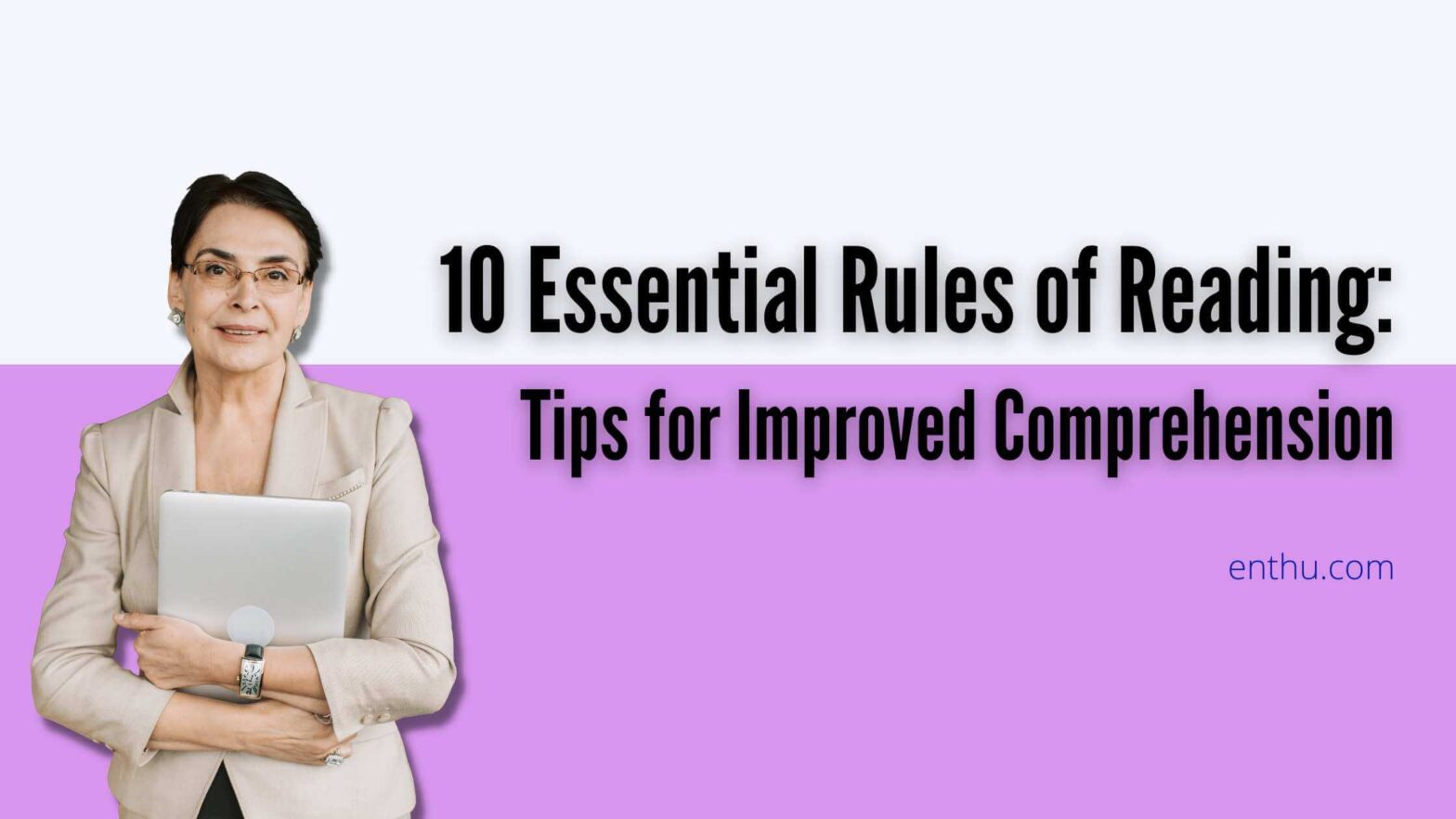Dr. Seuss once said, “The more your read, the more you will know. The more you know, the better places you will go.”
Indeed reading can take you anywhere. But to make reading a successful journey, one must know the rules of reading.
Don’t panic! By rules, I don’t mean anything stuffy—a few changes in habits, and you will know how to read like a pro. So, buckle up because I have cooked some exclusive tips for you.
10 Essential Rules of Reading
1. The Word of the Day Rules
The word-of-the-day rule is one of the essential rules of reading English. Select a new word every day, and find all its synonyms and how each is used in various contexts.
This rule will also help you broaden your stock of words, which will impact your reading and speaking tremendously. Once you find how one word can be used in various contexts, you will have more profound knowledge.
You wouldn’t need to read a line of a passage multiple times in case of a difficult word. It will save a lot of your time and you can prove yourself to be a skilled comprehension reader.
2. The Benjamin Franklin’s Rule
Benjamin Franklin said, “Never read a book without a pen in hand.” And I agree with him.
Keeping a pen is the first rule for reading. A pen helps you not just to read the book but also interact with the author.

Underline the words that you find new and add positive notes when you like a sentence written by the author. This activity will help you hone and increase your vocabulary.
Moreover, adding positive notes will help you get involved with the book you’re reading and feel a part of it. In return, it will positively affect your reading.
3. One Paragraph Rule
Read an entire paragraph before you start taking notes or highlighting it. It will help you get the text’s bigger picture and context.
That’s because once you reach the end of the paragraph, you find a summary statement that justifies the paragraph. Therefore, you will get better information to highlight without breaking your train of thought.
Moreover, the one-paragraph rule will also help you increase focus and comprehend your reading better. Soon, reading one paragraph will lead to one page without stopping, and you will master the art of speed reading.
4. The Loud Reading Rule
Loud reading will help you improve phonics, pronunciation, and spelling, whether reading a book or a newspaper or magazine. When you read the lines aloud you hear how you sound while pronouncing a word.
Moreover, you can also work on your ch, ph, es, and other vowel and consonant digraphs better once you start to read aloud. And remember to take help from technology, while reading aloud.

For example, you can record while you read and playback to understand where you’re faltering. You can also go on google and find out how a word is spelled in various dialects to master the pronunciation.
Speaking of pronunciation, did you know phonics helps you a lot with correct pronunciation and reading? Enroll in EnthuZiastic’s phonics classes and shine.
5. The Silent Reading Rule
Silent reading helps you focus on grammar. You have the time to focus on the lines written rather than the burden of perfectly orating them.

Silent reading also helps you understand the content and helps you retain thoughts in your subconscious mind. Thus, allowing you to comprehend what you are reading and apply the knowledge while reading a comprehension.
6. The Question Rule
Questioning is the ultimate way to improve your comprehension skills. Once you finish reading a book, article, or passage, note essential questions and keep them aside; start reading something else.
After you have finished reading it, come back and start answering the questions you have set. This practice will enhance your research skills and help you learn the passage by heart.

Try and follow this every day; before you know it, you will have the skill to understand how to read a comprehension successfully.
Check out EnthuZiastic Public Speaking Courses to learn with the best teachers.
7. The Vocabulary Rule
Note down every new word you learn while reading a book or an article, find its meaning, and learn it by heart. That’s because research suggests the importance of vocabulary is essential in reading comprehension.
Students with a good vocabulary don’t need to look into the dictionary while reading comprehension. It saves their time, and they can understand complex word meanings easily.
Moreover, a strong vocabulary also helps you understand how synonymous words can be used in different contexts. It’s one of the most useful skills you need while reading comprehension.
8. The Summary Rule
After finishing an article or a book, write a summary of what you have learned from reading it. When you use your words to describe what you have read, you get a better idea of the content.
Moreover, you can also relate to the content, thus, gaining actual knowledge. In addition to writing a summary, use them to draw analogies. It will help you determine whether you have read other books or articles with similar ideas.

Once you know how to draw analogies, you will understand comprehensions better and why they are written. You can answer complex questions like why you are given a particular comprehension and analogy behind it.
9. The Strategy Rule
Before you start reading, think about the 3 main types of reading strategies. They are skimming, scanning, and focused reading. Find which reading strategy you want to apply to your current article or book, and then start reading.
Skimming and scanning will be enough if you want specific knowledge from a book or an overview. However, focused reading should be your strategy if you wish for in-depth learning.
Students who want to improve their comprehension apply the focused reading strategy. Focused reading helps you find unique information in the book, which is impossible while skimming or scanning.
10. The Why Rule
Last but not least, find out the purpose of your reading. Why are you reading a book, and how will it help your comprehension practices? Once you find your purpose, reading will be an easier job.
In addition to finding the purpose of reading, build external knowledge on various topics and ideas. Research suggests having background information on a subject improves comprehension skills.

To gain knowledge, you can visit museums, read relatable journals, and watch documentaries.
When you have in-depth knowledge of various topics, it’s easier to draw analogies while reading comprehension and find the purpose of the writing.
FAQs
What are the three phases of reading?
The three phases of reading include pre-reading, while-reading, and after-reading stages. All three steps are crucial for students to achieve reading skills.
What are the three major components of reading?
The three major components of reading include decoding, fluency, and comprehension. Every student needs to understand and master these components throughout their academic journey.
What is the importance of Comprehension skills?
Comprehension skills add meaning to what you read. It helps you understand the bigger picture of content, why it is written, and what literary value it adds. For example, when you are asked to read something, you don’t just recite it; you understand what you are reading.
What are some benefits of reading?
There are umpteen benefits of reading. They include brain exercise, entertainment, increased concentration, literacy, and more.

Become a Leader
Master the art of public speaking. Learn with the best teachers.
Conclusion
Tips for comprehension might seem difficult now, but once you start practicing them, you will enjoy these activities thoroughly. So, read these tips by heart and wake up to good practices tomorrow morning. Best of luck!

